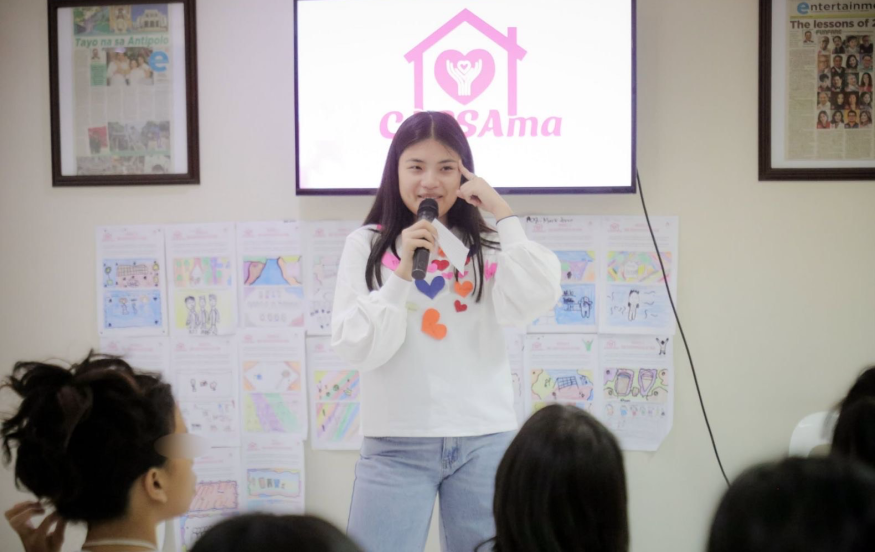
By age 17, most students are navigating their final year of high school. Cassandra Ynares is building institutions.
The Filipino teenager is the founder of CASAMA Foundation, a youth-led nonprofit reshaping the mental health landscape across the Philippines. In just over a year since its launch in June 2024, the foundation has delivered direct outreach, mobilized over 30 student volunteers, attracted national media attention, and, most recently, introduced a groundbreaking civic education program called School on Wheels—bringing structured human rights awareness to underserved regions.
What began as a community-focused initiative has rapidly evolved into one of the most promising youth-led social ventures in the country. And Ynares, balancing high school coursework with national advocacy and representing the Philippines as part of its delegation to the United Nations, is proving that age is no barrier to a severe impact.
Mental Health, Visibility, and a National Conversation
At the center of CASAMA's mission is a commitment to address the growing mental health crisis among Filipino youth. "There's a stigma around mental health in the Philippines," Cassandra says. "Access is limited, and conversations are even less common. I wanted to create something that offers support and changes how we talk about emotional well-being."
Her work has gained attention. In April 2025, The Philippine Star featured Cassandra and CASAMA's mission. The article highlighted the foundation's community-based model, which attracts youth volunteers and draws national interest. It also showcased support from well-known Filipino figures like Bimby Aquino, which helped raise awareness for Cassandra's cause.
However, Cassandra's goal goes beyond just awareness. "We want to be part of real lives, not just headlines," she says. This belief is best reflected in CASAMA's latest initiative, School on Wheels.
Taking the Mission Mobile: School on Wheels
School on Wheels started in March 2025 and is a mobile education program that visits impoverished communities all over Rizal Province. It delivers an eight-session curriculum that focuses on human rights, social responsibility, and safety. Hosted in local barangays (village halls) and community centers—often in open-air covered courts—the sessions combine interactive games, structured workshops, and open discussion to create a dynamic learning environment for youth.
In just six months, the program has reached over 400 students and operates with the help of 30 trained volunteers. Every student cohort completes a standardized eight-session track, developed by Cassandra in collaboration with her academic capstone advisor. The curriculum begins with foundational human rights concepts and gradually deepens into practical advocacy skills and local civic issues, including gender-based violence and school safety.
"One of the reasons School on Wheels has been successful," Cassandra explains, "is that it doesn't just educate—it empowers. Students leave with a new understanding of their rights and the tools to speak up."
Feedback forms collected after each cycle reveal a high impact: over 90% of participants reported an improved understanding of their rights and increased confidence in their ability to advocate for themselves. The program has also received formal recognition from the provincial government, which now helps identify the communities and students most in need of outreach.
Organizing with Precision and Purpose
Despite being a full-time student, Cassandra plays an active leadership role in both CASAMA and School on Wheels. While she's not physically present at every outreach session, she designs all content, manages volunteer training, and oversees the expansion roadmap.
Her organizational method is strikingly professional. Each community rollout is preceded by stakeholder engagement with barangay leaders, logistical mapping, and content planning. Standardization allows her to scale without compromising quality: "Every student, regardless of where they are, receives the same quality of curriculum," she emphasizes.
That level of thought and execution sets CASAMA apart from ad-hoc volunteer efforts. "We're not just reacting to a problem. We're building a model."
Beyond her work in the Philippines, Cassandra is also broadening her perspectives internationally. In the summer of 2025, she attended a program at UCLA, where she explored social impact and public policy. The experience reinforced her commitment to blending grassroots activism with global perspectives, sharpening the skills she brings to CASAMA and School on Wheels.
From Advocacy to Ambition: A Future in Public Leadership
While Cassandra's present work involves community outreach, her own aspirations are grander. "I'm considering political science or sociology in college," she states. "There's just so much structural reform that needs to occur, especially with how we handle mental health and education."
This is not a theoretical vision. Through CASAMA and School on Wheels, Cassandra is already living the very model of civic engagement that she wishes to duplicate. "Education and empowerment need not be confined to elite schools or urban centers. They must be extended to all children in all locations." Asked what drives her, she pauses. "I think young people are tired of being told to wait until they're older to make change. We're not waiting anymore."
Scaling for the Future
CASAMA is preparing to expand School on Wheels beyond Rizal Province. Funding and logistical issues are tough, but Cassandra remains hopeful. "We've shown this model works. Now we need to take it to more places."
She is looking into partnerships with NGOs and possible support from local businesses, but she insists that youth leadership should stay at the center. "The moment we hand off our vision, we lose what makes CASAMA effective."
At just 17, Cassandra has already moved from idea to execution, from one-on-one mentoring to scaling systems. Her next chapter—college, public policy, or law—may still be in formation. But her present impact is already reshaping the narrative on youth leadership in Southeast Asia.
"We're not just here to inspire," she says. "We're here to build."
© 2026 ScienceTimes.com All rights reserved. Do not reproduce without permission. The window to the world of Science Times.












